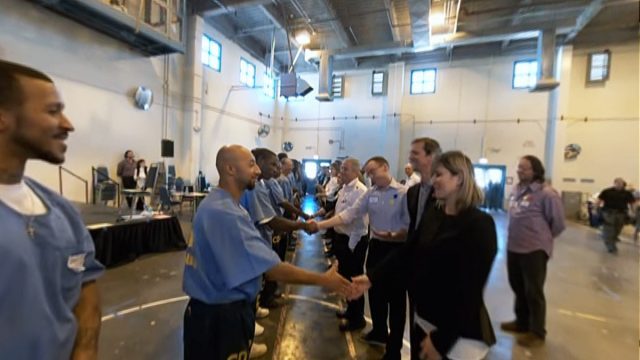Mark Zuckerberg recently posted the 360 film Step to the Line on his Facebook page, which highlights the challenges of living with the criminal justice system in the US, on both sides of the prison wall. The short documentary is an emotionally powerful 360 degree video production, funded by Oculus’ VR for Good initiative.
Created and directed by Brazilian filmmaker Ricardo Laganaro, Step to the Line was shot in a California maximum security prison, using a Nokia Ozo rig. The film documents an exercise regularly run by Catherine Hoke, founder of Defy Ventures, who provide a six-month non-profit entrepreneurship program for inmates at over 20 prisons in the United States.
 It involves a group of inmates, referred to as ‘entrepreneurs in training’ or EITs, standing in a line facing a group of Defy staff and volunteers. Hoke reads statements, for example “I’ve earned a four year college degree” or “I’ve lost someone I loved to gang violence” and the volunteers and EITs step towards or away from the line in the centre, depending on whether or not the statement resonates with them. The exercise is already very effective when viewed on a screen, but is particularly powerful in VR, as the 360 camera is set at head height, offering the viewer a unique perspective, looking into the eyes of people on both sides of the line. Another scene places the viewer in a cell, and the sense of scale induced by VR provides a better appreciation for the cramped living conditions.
It involves a group of inmates, referred to as ‘entrepreneurs in training’ or EITs, standing in a line facing a group of Defy staff and volunteers. Hoke reads statements, for example “I’ve earned a four year college degree” or “I’ve lost someone I loved to gang violence” and the volunteers and EITs step towards or away from the line in the centre, depending on whether or not the statement resonates with them. The exercise is already very effective when viewed on a screen, but is particularly powerful in VR, as the 360 camera is set at head height, offering the viewer a unique perspective, looking into the eyes of people on both sides of the line. Another scene places the viewer in a cell, and the sense of scale induced by VR provides a better appreciation for the cramped living conditions.
“One of the most powerful side effects of VR is empathy – the ability to understand other people better when you feel like you’re actually with them”, says Zuckerberg. “When I was in Alabama two months ago as part of my ‘Year of Travel’ challenge, one of the most powerful experiences for me was meeting Anthony Ray Hinton, a man who was exonerated and released after 30 years on death row. There’s nothing like meeting someone like Anthony in person, but VR can get you pretty close. It’s a reminder of how much work we have to do to guarantee equal justice for all.”
See Also: United Nations’ Creative Director on VR as the Ultimate Empathy Machine
Premiered at the Tribeca Film Festival, the film is the ninth project to come out of the Oculus VR for Good Creators Lab, an initiative to pair filmmakers with non-profit organisations to champion social causes across the world. It is viewable as a 360 video on Facebook or through Oculus Video using a Gear VR or Oculus Rift (or HTC Vive using the Revive injector). It can also be accessed on Facebook Spaces if you save the post before going into the app.





